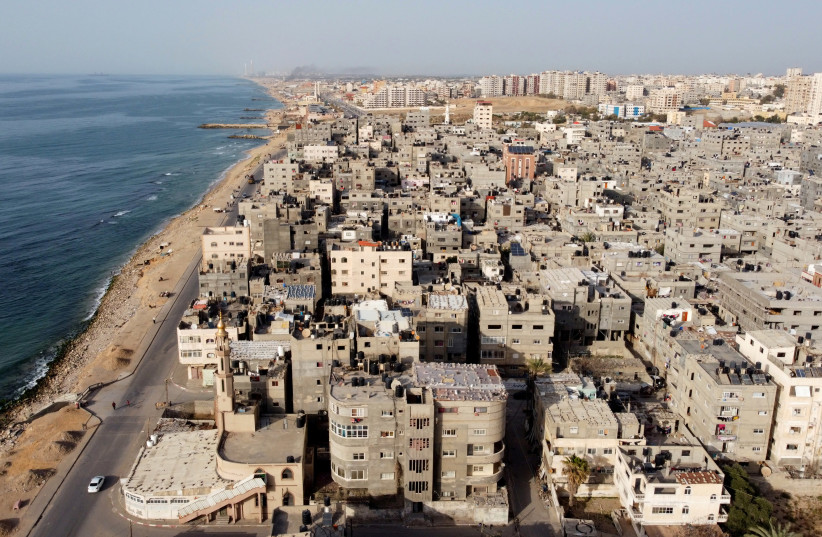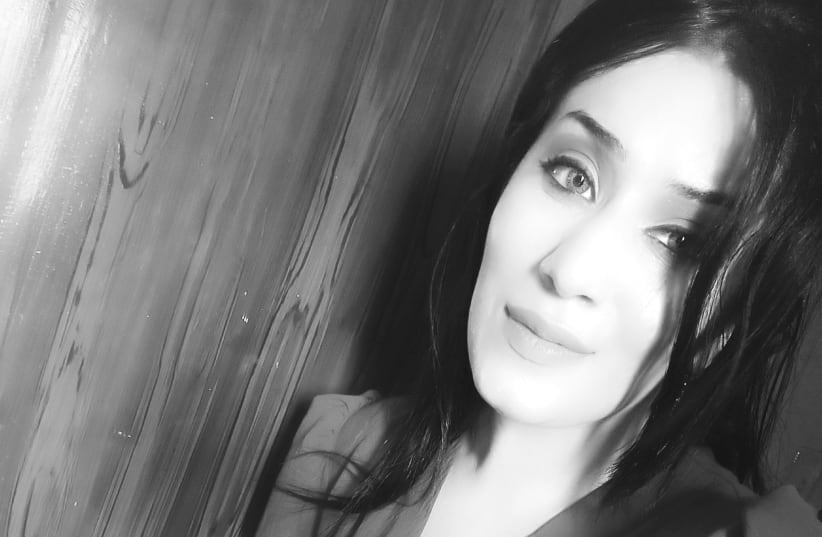Manar al-Sharif spent two weeks on a hunger strike in solitary confinement in a Gazan prison. There were no windows or lights, no shower and no access to pain medication when she had a stomachache or a headache.
“It was very hard, but I am strong,” Sharif said in a video interview this week from an undisclosed place she is staying in the region.
The prison guards were unresponsive to her pain. “They will let you ask [for help], but no one will answer.”
Sharif, 24, was arrested in April 2020 for the crime of hosting and participating in a Zoom call between Israelis and Gazans, a crime that a Gaza military court said was “weakening revolutionary spirit,” according to an article published in The New York Times that year.
Sharif spent three months in a women’s prison.


“If a girl does something wrong in that society – if she has relations with a man or something - they will arrest and jail her,” she said. “And of course there were women who stole or killed. But everyone knew I was jailed because I tried to work toward normalization. And they wanted to know who was paying for me, was Israel paying for me.
“I am not from Gaza, and for them, what I was doing in Gaza was really dangerous,” she continued. “They did not believe me that I was trying to help them. They did not understand.”
During the time she was there, they would not let her call a lawyer or speak to her family. Eventually, labeled a “dangerous person,” she was transferred to Egypt, where her family was living at the time.
SHARIF WAS born and raised in Syria. Her family moved to Egypt in 2013 amid the Syrian civil war.
She was a teenager at the time; and when she completed high school, her dream was to go to college. But her family was very religious and conservative and did not want her to be on a mixed campus, where she could become involved with men or lose her connection to Islam.
After a year of begging her parents, they agreed to the Islamic University of Gaza, where they knew she would continue to “be in good hands,” and where other members of Muslim society would help keep a close rein on her behavior.
“Gaza has a reputation for how strict they are,” Sharif explained. “It is not an open society. They are very strict, and anyone who will do anything wrong will get jailed.”
Sharif arrived in Gaza in 2017 to study journalism, but after only a few months she dropped out, appalled by what she called the “Hamas propaganda” that was infused in the school. She said the university was full of Islamism and that they used the school to recruit members, explaining how the terrorist group operates and why.
“It wasn’t professional and it wasn’t journalism,” Sharif said.
She had been teaching herself English for a number of years and decided that she would just start writing anywhere that would take her.
“I wanted to learn how to write, to make my own media,” she said.
She started penning articles for American and Australian publications, including some Jewish publications. She connected with Israelis and wrote for Israel, too, though usually under a different name, for fear of repercussions from Hamas.
“I was writing about the atrocities inside Gaza and what happens to the children and the women,” Sharif described. “And I connected with the people to help them, to tell them that if there was anything they wanted to share, I could help.”
She also connected with a group of young Gazans working to create change in society, known as the Gaza Youth Committee, eventually rising to the top ranks of the organization.
The youth were focused on creating a better life for the people of Gaza, including working toward peace between Israel and Gaza for the good of all. Among their initiatives was something they called Skype with Your Enemy – Zoom chats. In April 2020, they marketed an upcoming Zoom on the topic of COVID-19 on Facebook and drew a crowd of 200 participants.
Hamas was not happy about it. So it arrested Sharif and several of the other event planners. Some were jailed as long as six months.
Sharif had been jailed once before, about a year prior, when she hosted a farewell lunch for a friend at her home that brought together men and women. Someone saw the event and called the Gazan Police.
“They started yelling at us like we were having sex or something,” she said. “We were trying to explain, but they would not listen, so they just beat me up. And I spent two nights in jail.”
A SENIOR military official who has been operating in the area of Gaza intelligence but who was not aware of Sharif’s specific situation said that her depiction “sounds very logical and very much like the things that Hamas does.
“They do not let people criticize them, talk about how they torture the public, the organization’s financial corruption – anything that questions their legitimacy,” he said. “If you say something against Hamas, they will harm you and your family.”
He said that Hamas can fire people and make it so they cannot get work; that in certain cases there are acts of violence, though these are generally not “official,” but, rather, someone is sent just to shake things up by causing physical harm.
“If someone really hurts a senior-level Hamas official, then, of course, that person will pay the price,” the official said.
He added that there is no freedom of the press in Gaza either.
IN THE MEANTIME, Sharif and her family left Egypt. She moved to a new home in the region, and her family to another state. She remains close only with her mother.
She has built a new network, including many Israeli friends who have come to visit her in her new home or chat with her online.
She is also teaching Arabic via Zoom to help support herself until she moves to Canada, where she has been accepted to university. She admitted that she is struggling financially and otherwise.
A.Y. Katsof from Esh Kodesh is one of Sharif’s students, but he is also one of her biggest fans.
“She decided that, no matter what, she is going to tell the true story,” he said. “I feel a duty as an Israeli to stand up with her and help her to do that. I know there are other people who think like her, but they are too afraid. Maybe if we help her, others will speak up, too.”
He said that Sharif is “brave and strong,” and she wants to study political science.
“I could see her speaking before the United Nations one day,” Katsof said. “We need strong voices like that – strong women who are not scared to stand up and tell the truth.”
SHARIF’S WHATSAPP profile picture is a quote: “Shame dies when stories are told in safe places.”
She said that she has a dream of bringing about a solution for the people of Gaza.
She said that she believes the majority of Gazans want peace with Israel and opportunity.
“We have to protect people there,” she said. “It is so hard to see people living that way.... Maybe when I go to Canada, I will have better access to protect them.”
